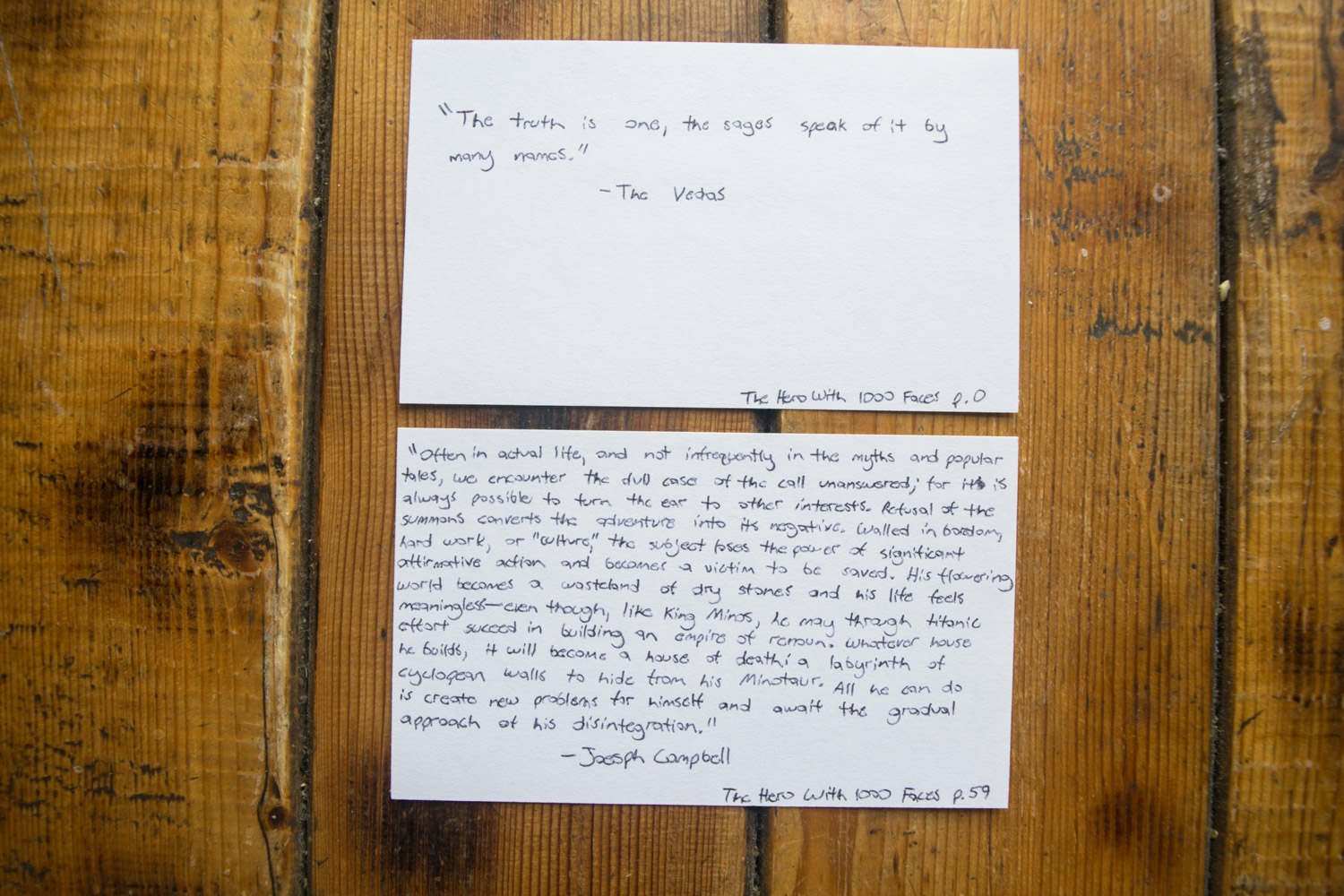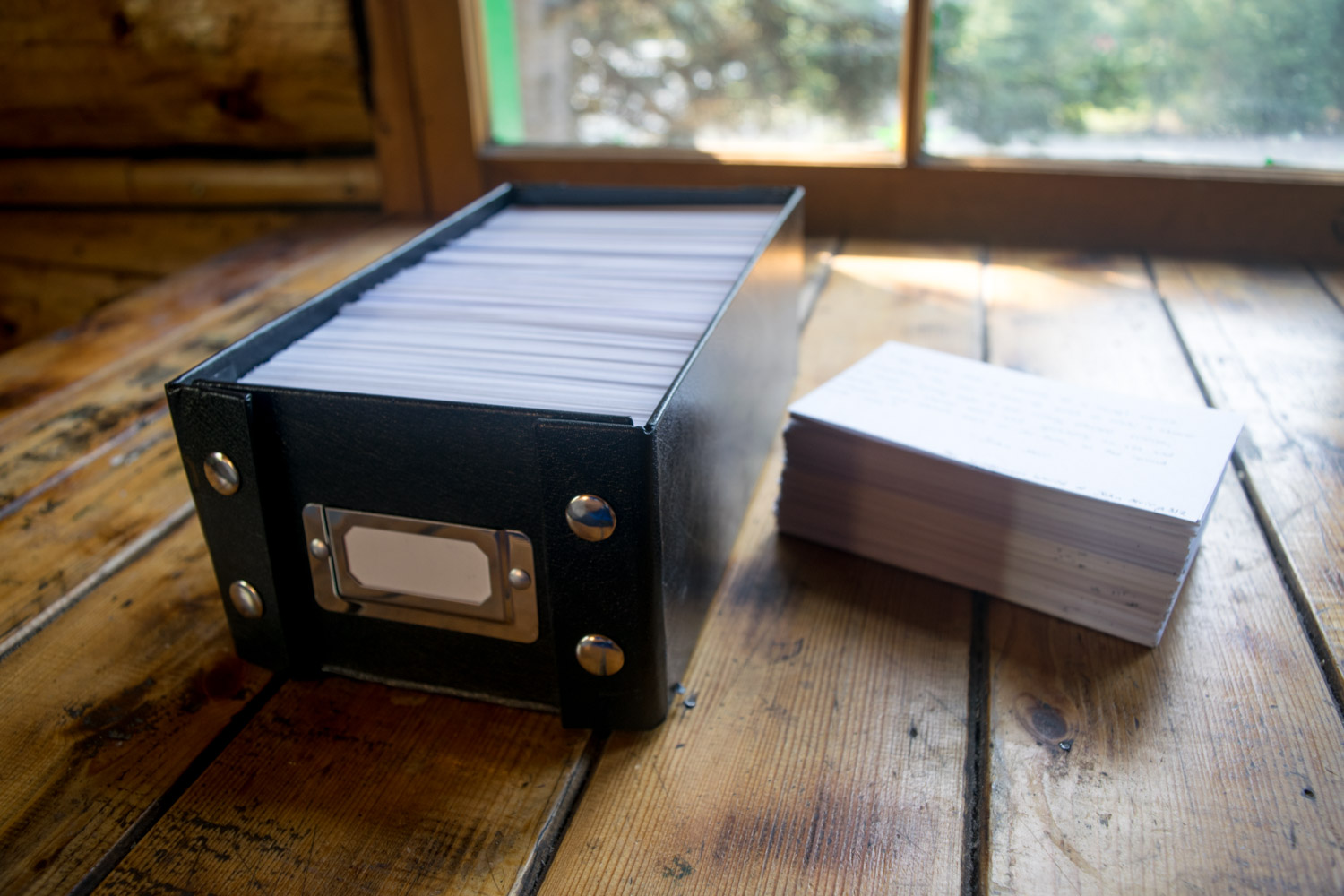The Commonplace Book
By Ethan Maurice | August 15, 2017
From Thomas Jefferson and Charles Darwin, to Oscar Wilde and Ralph Waldo Emerson, great thinkers throughout history did more than read the books they picked up. Many wrote and stored the most useful, profound passages in something called a Commonplace Book—an easily review-able collection of wisdom and ideas for their personal use.
We humans forget much more than we remember. The Commonplace Book was a sort of outboard memory, a way to keep and revisit our most insightful insights. In the 18th and 19th centuries, these collections of wisdom were so popular that "commonplacing" was an actual term for the act of writing in your Commonplace Book.
Somewhere along the line, Commonplace Books retreated from popular culture, yet thankfully, never disappeared completely. A year and a half ago, I discovered and began to build my own based on the index card system of one of my favorite authors. Today, I'm 56 books in and have over one thousand index cards comprising my Commonplace Book. I recently filled up my first "shoe box" of index cards, a milestone that inspired me to finally write this article.
I'm not, in the least, exaggerating when I say: you only retain a fraction the wisdom you encounter if you're not doing this. The difference in how much I've retained from books before and after starting my Commonplace Book is stunning. I've developed this strange, wonderful ability to recall hundreds of quotes I've taken notes on. Passages I've penned come to mind the instant they become relevant in life. And I now have this shoe box chock-full of wisdom to refer to for guidance or to re-center myself.
The Commonplace Book is so useful because it enormously extends the limitations of human memory. I cannot hold and reference a thousand of the most profound concepts I've ever encountered in my head—but with a Commonplace Book—I can! It's like highly selective, superhuman memory.
Researching the history of the Commonplace Book, I stumbled across a fascinating talk by Steve Johnson author of a book called Where Good Idea Come From. Commonplace Books comprising much of his talk, he hits the nail on the head in his introduction to them:
“Commonplace Books were crucial to the explosions of intellectual activity in the enlightenment in the 1700's and 1800's. What people would do with Commonplace Books is they would find interesting quotes and jot them down and transcribe them word by word in these Commonplace Books. They would intersperse them with their own ideas and thoughts about the world, their various inquiries, and crucially they would then go back and reread through these books. So they would take all these different voices, different snip-its, and remix them, intersperse them with their own ideas, and by re-reading all these different voices they would give birth to their own intellectual sensibility of the world... It was a crucial intellectual vehicle of the period.”
If I could only save one possession from a burning building, it would probably be my Commonplace Book. In fact, I actually bought and stored my index cards in a fireproof safe while backpacking around New Zealand last winter.
If you read — one of the most enlightening acts a human can do — I think you should start one too.
Here's how my index card system works:
1. I read with a pen at hand. When I come across a particularly useful, insightful, or profound passage, I mark it with asterisks and continue on reading.
2. A couple days after finishing a book, I flip back through looking for passages I've marked. If it still strikes me as worthy of my Commonplace Book, I copy the passage onto an index card along with the book's title and page number.
3. After finishing the index cards for a book, I file them away in my “shoe-box” for future reference. Currently, my cards are organized by book. In the future, I plan to group them broadly by topic as I look for overlapping ideas, beliefs, and tactics shared among great individuals (a sort of search for universal truths).
Some tips for building your own system:
- What you read makes all the difference. I read classics that are as relevant now as they were ages ago; biographies of great human beings; books that teach us how to live; novels written with intent beyond entertainment. The idea is to accumulate a wide scope of wisdom.
- I'm looking for actionable knowledge, ideas, concepts... Anything I'd like to reference again in the future. Such passages usually jump out at me, beckoning to be asterisked. You can include whatever you want in your Commonplace Book, just understand the goal here is not collect facts or become a master of trivia.
- Feel free to take notes in the margins of books next to marked passages and include them on an index card. I often have thoughts that stem from a passage that I don't want to let slip, this is how I record them.
- After finishing a book, wait at least a couple days to write out your index cards. Time away from a book acts as a filter and upon returning, you'll wonder why you marked some passages—don't write those down.
- The average book generates about 20 index cards for me, though, the amount varies widely. The most index cards I've ever written from a single book: 46. The least: 1.
- Books aren't the only source to include in your Commonplace Book. You can pull lines from movies, songs, podcasts, or anything else. One of my favorite index cards is the chorus from a John Mayer song called Walt Grace's Submarine Test, January 1967:
“Cause when you're done with this world, you know the next is up to you.”
- Don't worry about organization until you've amassed a solid amount of cards. Group them by book in the beginning for easy reference, you can organize and reorganize them as often as you want later (the beauty and functionality of using index cards instead of a notebook).
Henry David Thoreau once wisely said:
“As a single footstep will not make a path on the earth, so a single thought will not make a pathway in the mind. To make a deep physical path, we walk again and again. To make a deep mental path, we must think over and over the kind of thoughts we wish to dominate our lives.”
While my index card based Commonplace Book is easily referable and re-organized, power also lies in the repetition of building it. When merely reading a book, we only get a single exposure to its best, most important passages. But with the index card system, we get many exposures to the same passage, walking that mental path over and over.
We get a first exposure when reading a book. A second, when re-reading a passage to figure out exactly what to circle. A third, after finishing the book and returning to decide if the circled passage is worth writing down. And a fourth prolonged exposure, transcribing it. Now easily referable, the passage can be encountered again and again, walking a mental pathway deeper and deeper into our minds.
Of course, it would be faster and easier to keep a Commonplace Book electronically—to copy and paste and organize quotes with a program like Evernote—however, I've found writing index cards by hand also works to write a passage deeper into my mind. The additional time this takes also acts as a quality filter as I won't waste my time writing out less important passages.
The Commonplace Book is nothing short of life-altering—a catalyst for reading that has immeasurably improved my ability to retain wisdom that would otherwise be momentarily encountered and soon lost.
If you read, I cannot urge you strongly enough: build your own Commonplace Book! Otherwise, we're mere fisherman sailing an ocean of knowledge, reeling in big fish only to toss them back overboard, basking in the hollow thrill of catch and release.
Get started on your own Commonplace Book:
Assuming you have a pen lying around somewhere, all you need are index cards (I use blank, 3x5 cards) and a container to hold those cards to get started.
Not sure what to read? Here's a list of the best books I've ever encountered. Here's a list of recommendations from Joseph Campbell, author of the book that's produced the most index cards in my Commonplace Book. Here's another list from someone I immensely respect.





